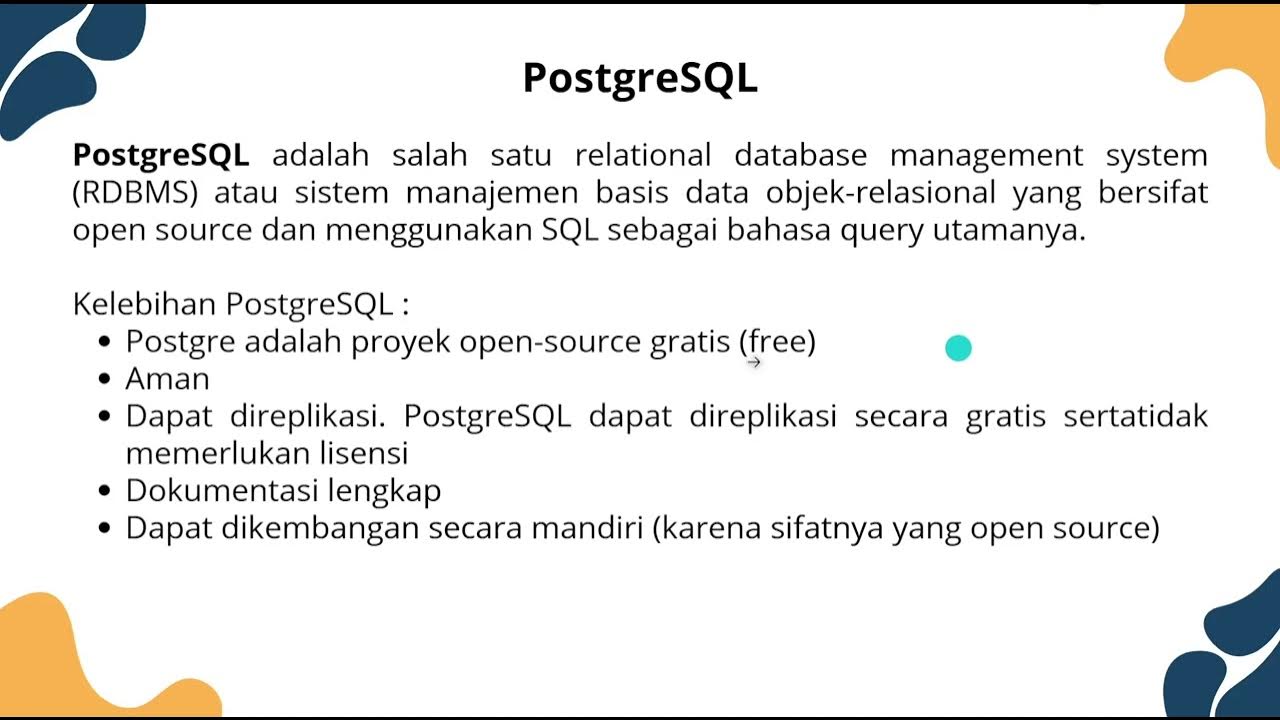Lec-2: Introduction to DBMS (Database Management System) With Real life examples | What is DBMS
Summary
TLDRThis introductory lecture on Database Management Systems (DBMS) emphasizes its significance in competitive exams and the tech industry. It explains DBMS as a crucial tool for managing structured data through operations like insertion, deletion, and updating. The lecture introduces the concept of a database as a collection of related data and distinguishes between structured and unstructured data, highlighting the prevalence of structured data in systems like RDBMS. It also mentions various DBMS platforms like SQL Server and Oracle, underlining the importance of relational databases in storing and managing data efficiently.
Takeaways
- 📘 DBMS is crucial for competitive exams like GATE and UGC NET as well as for interviews in top companies.
- 🚀 The importance of DBMS has increased over the years, especially in the context of top companies relying heavily on databases.
- 🗃️ A database is defined as a collection of related data, which can be structured or unstructured.
- 🔍 Structured data is organized in a specific format, such as tables, and is commonly managed by RDBMS.
- 🏢 Examples of structured databases include those of Indian Railways, IRCTC, and university systems, which follow a particular structure.
- 📚 RDBMS is the most important type of DBMS for competitive exams, focusing on how to store and manage structured data in tables.
- 🛠️ DBMS provides a set of operations that facilitate user interaction with the database, such as insertion, deletion, and updating of data.
- 🌐 Users are not concerned with the physical location of the data; DBMS abstracts this away and allows for remote data manipulation.
- 🛑 Different companies have developed various DBMS platforms, such as Microsoft's SQL Server and Oracle's database systems.
- 📈 Despite the rise of unstructured data, structured data and RDBMS remain significant, especially in the context of competitive exams.
- 🔑 The script emphasizes the fundamental concepts of RDBMS, setting the stage for further detailed exploration in subsequent lectures.
Q & A
Why is DBMS considered important for competitive exams like GATE and UGC NET?
-DBMS is important for competitive exams because it is a crucial subject for B.Tech and BCA students and is frequently asked about in interviews and exams due to its relevance in top companies' operations.
What is the significance of DBMS in the current job market?
-DBMS is significant in the job market because most top companies, including major MNCs like Facebook, Google, and Amazon, rely heavily on databases, making knowledge of DBMS essential for many job roles.
What is the basic definition of a database according to the script?
-A database is defined as a collection of related data, where the data is organized in a way that it is relevant to a specific context or organization, such as Indian Railways or Facebook.
What are the two main components of a database system?
-The two main components of a database system are the database itself, which is the collection of data, and the DBMS, which is the system that manages the database.
What is the difference between structured and unstructured data?
-Structured data is data that is stored in a specific format or structure, like a table with rows and columns. Unstructured data, on the other hand, does not have a predefined format and can include various types of data like photos, videos, and text without a specific organization.
Why is RDBMS preferred for managing structured data?
-RDBMS, or Relational Database Management System, is preferred for managing structured data because it uses tables to organize data in a way that is easy to access, update, and manage, making it suitable for applications like IRCTC where data needs to be consistently structured.
What are the common operations performed on a database?
-Common operations performed on a database include insertion (adding new data), deletion (removing data), and updating (modifying existing data).
How does DBMS facilitate user interaction with the database?
-DBMS facilitates user interaction by providing a system of operations that allows users to easily perform tasks such as searching, updating, inserting, and deleting data, without needing to know the physical location of the data.
What are some examples of different DBMS created by various companies?
-Examples of different DBMS created by various companies include Microsoft SQL Server, Oracle's different versions of SQL, MySQL, and IBM's DB2.
Why is the focus on structured data in the context of RDBMS?
-The focus on structured data in the context of RDBMS is because it is the type of data that RDBMS is designed to manage effectively. Structured data is organized in a predefined format, typically in tables, which RDBMS can handle through its relational model.
What percentage of data on Earth is unstructured according to the script?
-According to the script, approximately 90% of the data on Earth is unstructured.
Outlines

Dieser Bereich ist nur für Premium-Benutzer verfügbar. Bitte führen Sie ein Upgrade durch, um auf diesen Abschnitt zuzugreifen.
Upgrade durchführenMindmap

Dieser Bereich ist nur für Premium-Benutzer verfügbar. Bitte führen Sie ein Upgrade durch, um auf diesen Abschnitt zuzugreifen.
Upgrade durchführenKeywords

Dieser Bereich ist nur für Premium-Benutzer verfügbar. Bitte führen Sie ein Upgrade durch, um auf diesen Abschnitt zuzugreifen.
Upgrade durchführenHighlights

Dieser Bereich ist nur für Premium-Benutzer verfügbar. Bitte führen Sie ein Upgrade durch, um auf diesen Abschnitt zuzugreifen.
Upgrade durchführenTranscripts

Dieser Bereich ist nur für Premium-Benutzer verfügbar. Bitte führen Sie ein Upgrade durch, um auf diesen Abschnitt zuzugreifen.
Upgrade durchführenWeitere ähnliche Videos ansehen
5.0 / 5 (0 votes)






